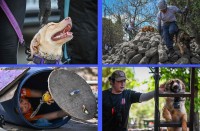(Eagle News) – Three more additional barangays in Quezon City were included in the list of areas affected by the African Swine Fever, according to the Department of Agriculture.
The DA said that it received “incident reports” that validated that ASF had also affected barangays Tatalon, Pasong Tamo and Tandang Sora in Quezon City.
Because of this, the list of affected barangays in Quezon City had reached five including the earlier named barangays of Payatas and Bagong Silangan.
The DA had earlier named barangay Commonwealth as included in the list of ASF-affected areas in Quezon City, only to retract this statement later saying that there was really no ASF incidents in Bgy. Commonwealth.
Quezon City mayor Joy Belmonte said that the city veterinary office had already started culling pigs surrendered by backyard raisers in the said barangays.
She said that pigs within the 1-kilometer radius of the additional barangays confirmed to have ASF will also be culled, per the 1-7-10 protocol of the DA.
Belmonte also again appealed to hog raisers in the city to voluntarily surrender their pigs so they can avail of the local government’s financial assistance of P3,000 per pig.
To date, the DA Crisis Management Task Force on Swine has reported that about 12,000 head of swine tested positive of ASF in more than 20 barangays in Rizal, Bulacan, Pampanga and Quezon City.
“This represents one-third of the total depopulated pigs in “ground zero” or within the one-kilometer quarantine zones, following the 1-7-10 protocol,” according to task force head Dr. Reildrin Morales.
“Our commitment to protect the health and safety of pork-consuming public and the ₱260-billion swine industry — in partnership with the LGUs, Philippine National Police, military and other government agencies and the private sector — is stronger than ever,” said Agriculture Secretary William Dar.
“In fact, starting last week, we have deployed 100 additional staff to support laboratory operations, and airport and checkpoint inspections, as part our elevated response in ASF- affected areas,” Dar said.
“Thus, we call on for continued vigilance and cooperation of the industry and the general public to prevent this disease from further spreading.
What’s on the line is the future of the swine industry, where 65 percent is shared by small backyard raisers,” he added.
While the disease is not transferrable to humans and other animals, ASF fatally infects a swine herd. The disease has no known vaccine yet.
(with a DA release)








